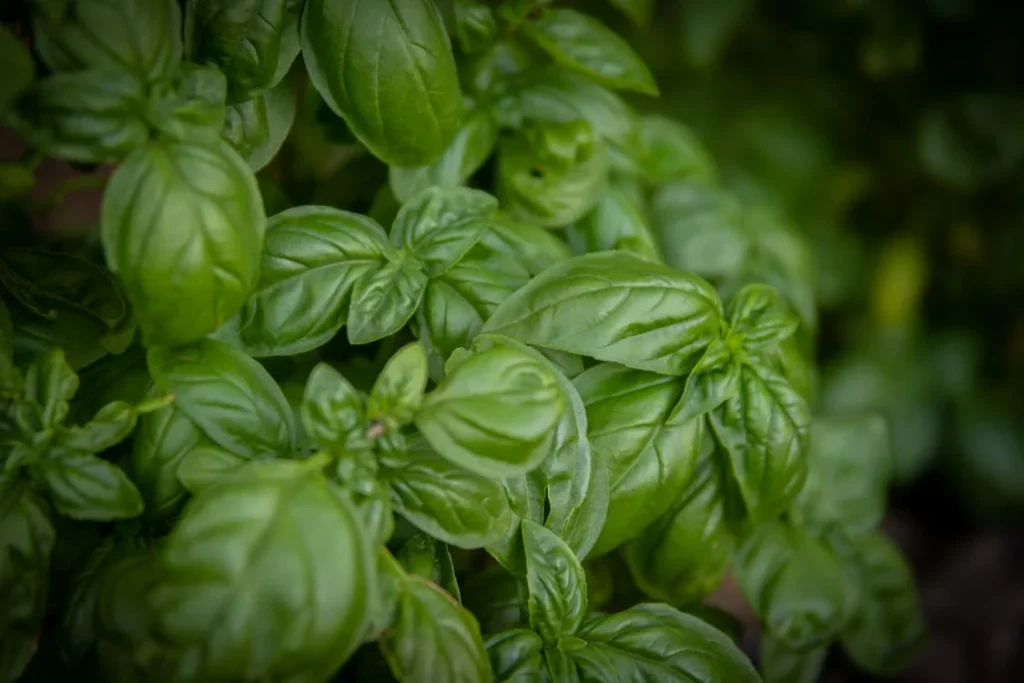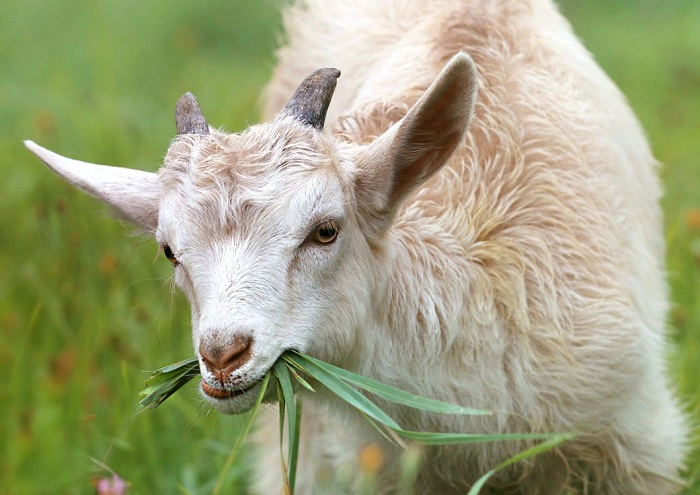Basil, the fragrant herb known for its culinary uses, might pique your curiosity as a goat owner. Can these curious creatures enjoy the taste of basil alongside their usual hay and browse? The answer is a bit more nuanced than a simple yes or no. While basil isn’t inherently toxic to goats, incorporating it into their diet requires some caution and understanding. This guide will explore the potential benefits and drawbacks of feeding basil to your goats, along with tips on responsible feeding practices and alternative food options.
The Benefits Of Feeding Your Goat Basil (In Moderation)
Basil offers some potential benefits for goats when consumed in limited quantities:
- Aromatic Appetizer: The strong aroma of basil can be enticing to goats, stimulating their appetite and encouraging them to try new things. This can be helpful for picky eaters or goats recovering from illness where their appetite might be suppressed.
- Source of Antioxidants: Basil contains antioxidants, which can help protect your goat’s cells from damage caused by free radicals. However, the amount of antioxidants obtained from a small amount of basil would be minimal.
- Digestive Aid: Some believe basil can aid digestion in goats. While research is limited in this area, the presence of essential oils in basil might have mild carminative properties, helping to expel gas and reduce bloating.
- Variety in Diet: Just like humans, goats enjoy a bit of variety in their diet. Occasionally offering basil can add some excitement to their usual grazing routine. Remember, variety should never compromise their overall balanced diet.
Things To Watch Out Out For When Feeding Basil to Goats
Despite the potential benefits, there are some important considerations when offering basil to your goats:
- Low Nutritional Value: Basil is primarily a water-based herb with minimal nutritional value. It lacks protein, essential vitamins, and fiber, crucial components of a healthy goat diet.
- Risk of Upset Stomach: Large quantities of basil can upset your goat’s stomach, particularly if they’re not used to it. The essential oils in basil can irritate their digestive system, leading to diarrhea or bloating.
- Pesticide Contamination: Commercially available basil might have been treated with pesticides or herbicides. These chemicals can be harmful to your goats. Always choose organic basil or grow your own if you plan to offer it to your goats.
- Choking Hazard: Large basil leaves, particularly the stems, can pose a choking hazard for younger goats. Always supervise your goats when they have access to basil.
- Potential Allergic Reaction: While rare, some goats might have an allergic reaction to basil. Watch for signs of skin irritation, sneezing, or respiratory trouble after consuming basil.

How Often Should You Feed Your Goat Basil?
Considering the potential downsides, offering basil to your goats should be a very occasional treat, not a regular part of their diet. Here are some guidelines:
- Limited Quantities: If you choose to offer basil, keep the quantity very limited. A small handful, no more than a few leaves at a time, is sufficient.
- Monitor Closely: Always supervise your goats when they have access to basil. Watch for signs of digestive upset or choking hazards.
- Alternatives Available: There are many safer and more nutritious options available for adding variety to your goat’s diet. Focus on providing a variety of safe browse options and prioritize a balanced commercial feed.
How To Prepare This Food When Feeding Your Goat Basil
Since basil is not a recommended staple food, detailed preparation isn’t necessary. However, here are some basic tips if you do choose to offer it:
- Fresh is Best: Offer only fresh, green basil leaves. Avoid wilted or brown leaves, as they might be less palatable or harbor mold.
- Size Matters: For younger goats, chop larger leaves into smaller pieces to minimize the risk of choking.
- Limited Access: Don’t provide a large amount of basil at once. Offer a small handful and monitor their intake closely.
Can Baby Goats Eat Basil?
Absolutely not. Baby goats, or kids, have even more sensitive digestive systems than adult goats. Their bodies are still developing, and they require a specific diet formulated for their needs. Basil’s essential oils and potential for digestive upset make it unsuitable for young goats. Stick to high-quality milk replacer and age-appropriate commercial feed for your precious kids.
What Other Foods Can Goats Eat?
Goats are natural browsers and thrive on a variety of forages, including:
- Grasses: A variety of grasses like orchard grass, brome, and fescue make up a significant portion of a goat’s diet.
- Weeds: Many common weeds like dandelions, clover, and plantain are safe and nutritious for goats. However, always identify weeds correctly before offering them to your goats, as some can be toxic.
- Shrubs: Goat-safe shrubs like willow, hazelnut, and blackberry bushes can be excellent sources of browse. Ensure the shrubs haven’t been treated with herbicides or pesticides before allowing your goats access to them.
- Fruits and Vegetables: Goats can enjoy occasional treats of fruits and vegetables like apples, pears, carrots, and pumpkins. Remember, these should be offered sparingly as treats, not dietary staples.
- Hay: High-quality hay provides essential fiber and roughage, especially during winter months when fresh forage is scarce. Choose hay varieties like alfalfa for growing goats and grass hay for adult maintenance.
Important Note: Always introduce new foods gradually to avoid digestive upset.

How To Give Your Goat A Healthy And Balanced Diet
Creating a balanced diet for your goats is key to their overall health and well-being. Here are some essential components:
- High-Quality Hay: Hay should be the foundation of your goat’s diet, providing them with the necessary fiber for proper digestion. Aim for at least 2-3 pounds of hay per adult goat daily.
- Commercial Feed: A balanced commercial goat feed formulated for their specific age and life stage fills nutritional gaps and ensures they receive essential vitamins and minerals. Follow the feeding guidelines on the feed bag based on your goat’s weight and activity level.
- Fresh Water: Clean, fresh water is vital for all animals, including goats. Ensure they have constant access to a clean water source.
- Mineral Lick: A mineral lick provides essential minerals like calcium, magnesium, and sodium that might be lacking in their regular diet. Choose a commercially available mineral lick specifically formulated for goats.
- Browse: Offering a variety of safe browse options like grasses, weeds, and approved shrubs can enrich your goat’s diet and provide them with mental stimulation. However, prioritize hay and commercial feed for their core nutritional needs.
- Limited Treats: Occasional treats like fruits and vegetables can be offered in moderation. Remember, these are not replacements for a balanced diet.
Consulting a Veterinarian:
For personalized dietary advice specific to your goat’s breed, age, and health condition, consulting with a veterinarian is highly recommended.
Final Verdict: Basil – An Occasional Aromatic Treat, Not a Staple
While basil can be a tempting addition to your goat’s diet due to its enticing aroma, it offers minimal nutritional value and comes with potential health risks. There are many safer and more nutritious browse options available for your goats. Focus on providing a balanced diet with high-quality hay, commercial feed, fresh water, and a mineral lick. If you choose to offer basil at all, let it be a very occasional treat in strictly limited quantities and only under close supervision. Remember, a happy and healthy goat is a goat with a balanced and nutritious diet!

